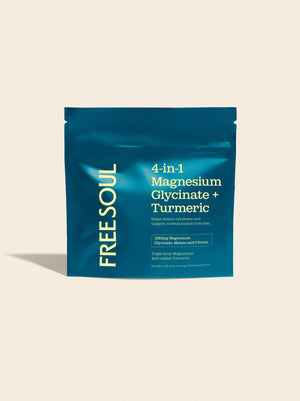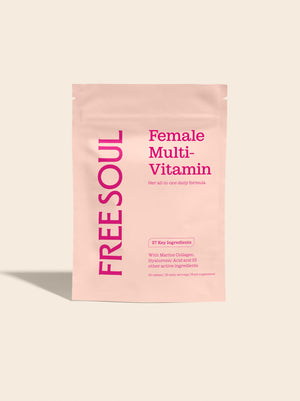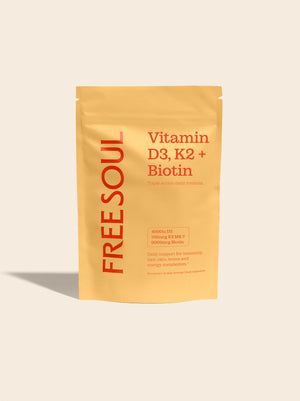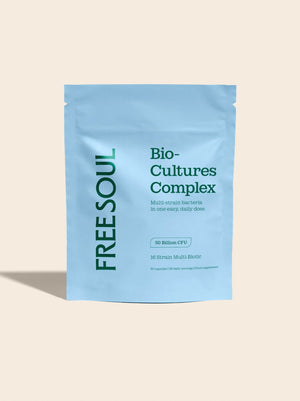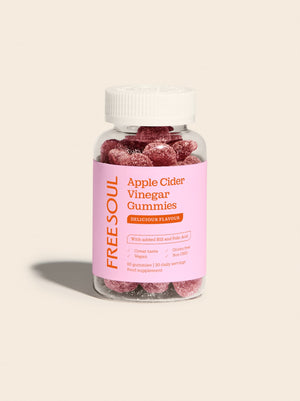Fatigue that hits like a truck? Mood swings that give you whiplash? Hot flashes out of nowhere? These can all be part of the menopause package, and it can be a lot to handle. You’ve probably been bombarded with different suggestions for how to handle it all, and it can be kind of overwhelming. But among it all, there’s one supplement you might not have considered: Creatine.
So why is Creatine for menopause different? We talked to Natalie Rouse, Registered Nutritionist and Head of Nutrition at Free Soul, about the unique needs of menopausal women and why Creatine is a supplement they should know about. “Many women don’t realise that Creatine, often seen as a ‘gym supplement’, has been well researched for its contribution to brain and muscle health, which can be particularly beneficial during menopause,” says Natalie.
What even is Creatine?
Creatine is a compound naturally produced and stored by your body. It’s used to produce ATP (adenosine triphosphate), which is your body’s main energy source. It is what your body reaches for when it needs quick bursts of energy, like during a sprint or a walk up a steep hill.
As Natalie explains, “Only a little ATP can be stored at any time, so physical activity depletes levels quickly. Taking Creatine makes sure your body has what it needs to make more ATP, so it has energy when it needs it most”.
For a deeper dive into Creatine, mosey on over to our other blogs ‘What is Creatine and what does it do’ and ‘What does Creatine do for women?’
Is Creatine good for menopausal women?
The short answer? Yes. From perimenopause to post-menopause, oestrogen levels decline, impacting muscle mass, energy, and cognition. Oestrogen is an anti-inflammatory and a neuroprotector, and as it declines the effects can be felt as fatigue, slower recovery, and brain fog.
“By supporting energy metabolism at a cellular level, Creatine can support your body in maintaining balance. Creatine also aids cellular hydration, and a more hydrated cell is a better functioning cell.” says Natalie. “Creatine doesn’t directly influence your hormones, but it contributes to the way your body responds to their fluctuations. Your brain, muscles, and nervous system all rely on ATP to function, and it’s these systems that feel the strain during menopause”.
So, while Creatine isn’t a magic fix, it’s a simple way to help you feel stronger and more resilient when hormones are causing disruption.
Benefits of Creatine for women in menopause
From mood support to cognitive function, the relationship between Creatine and menopause is getting a lot of attention, and for good reason.
Stay strong
With menopause comes sarcopenia (a decline in muscle mass), leaving many women feeling not quite as strong as before. Because Creatine is involved in ATP production, it is often taken by people looking to improve performance at the gym – but it’s not only for those bench pressing hundreds of pounds.
“Research suggests that when combined with resistance training, Creatine may help increase muscle mass in post-menopausal women,” says Natalie. “This can help menopausal women feel stronger in everyday life just as much as in the gym.”
Feel more switched on
Brain fog can be seriously inconvenient . Life (unfortunately) doesn’t just stop when your hormones start shifting, and suddenly focusing and getting through tasks feels ten times harder. It’s not your imagination, oestrogen has a big impact on neurotransmitters, and when they drop, your cognitive function (and confidence) takes a hit.
While Creatine can’t influence your oestrogen levels, its role in cellular energy metabolism helps your brain to function at its best. Supplementation has been shown to support focus, decision making, and memory, helping you to feel a bit sharper.
Find balance
Mood swings are among the most unwelcome symptoms of menopause. Hormonal changes wreak havoc on your emotions, and it can be quite a bumpy ride. Creatine helps provide neurotransmitters with ATP, including serotonin and dopamine.
As Natalie explains, “These chemical messengers are responsible for regulating your mood and emotions. By supporting brain energy metabolism, Creatine may help you feel more resilient during the hormonal shifts of menopause”.
Power through
Hormonal disruptions during menopause can leave you feeling more than a little fatigued. As oestrogen lowers, the way your body regulates energy and sleep is affected, making it harder to feel rested and energised throughout the day.
Add in some hot flashes and the mental load midlife women often carry, and it’s no surprise that bone-tired becomes the new normal. Creatine fuels your cells with ATP, giving your body the energy it needs so you can keep pushing through. It’s no replacement for proper rest, but Creatine provides a little extra support so you can keep showing up, even on the hard days.
Move with ease
Muscle soreness and slower recovery are common during menopause. “Oestrogen plays a role in joint and muscle functions, so when levels fall, many women report feeling stiffer and experiencing post-exercise soreness,” says Natalie.
Creatine helps by drawing water into the muscles, keeping them hydrated and ready to move. It also helps with muscle recovery, so you can bounce back the next day, whether for another workout or just getting through another busy day.
So… Should I take Creatine?
Tired of feeling tired? While it’s not a fix-all solution to the symptoms of menopause, Creatine is a low-effort, high-impact way to support your body through the hormonal turmoil.
Here’s a quick recap of why Creatine may be the unsung hero you didn’t know you needed:
- Muscle strength – Creatine helps support muscle mass, especially when paired with resistance training
- Cognitive function – brain energy metabolism is essential for memory, focus, and decision making
- Mood support – contributes to emotional resilience by helping neurotransmitters function normally
- Reduce fatigue – keeping your cellular energy reserves topped up may help you feel more energised
- Easier recovery – Creatine supports muscle hydration and recovery, helping you feel more mobile and less achy
Still unsure? Have a chat with your GP or a dietitian about Creatine, they’ll be able to answer any questions you have about its effects and safety, particularly if you’re managing any health conditions or taking medication.
How to take it:
A daily dose of 3-5g of Creatine Monohydrate is recommended. Simply stir it into water, smoothies, or your other favourite drinks. The most important thing is consistency; taking it daily allows your Creatine levels to build up gradually over time.
Creatine and menopause FAQs
What is the best type of creatine for menopausal women?
Micronised Creatine Monohydrate is the most researched and easily absorbed form of Creatine. It’s considered safe for regular use, including during and after menopause.
Can women over 50 or 60 take creatine safely?
Yes. Creatine is widely regarded as safe for long-term use by adults of all ages. In fact, it may be particularly beneficial as we get older, supporting strength, energy, and cognitive function.
Can creatine help women lose weight?
Creatine isn’t a weight loss supplement, but it can support muscle maintenance and exercise performance, which may indirectly assist with weight loss.
Is creatine safe long-term?
Yes. Creatine is well-researched and widely considered safe for long-term use when taken at the recommended dose.
Can menopausal women take creatine daily?
Absolutely. Daily use is recommended, as consistency helps build up Creatine levels in the body over time for optimal results.
What does creatine do to women's hormones?
Creatine doesn’t directly affect women’s hormones. However, it does support systems like brain function, energy metabolism, and muscle health – all of which can be impacted by hormonal changes during menopause.









